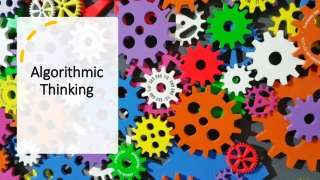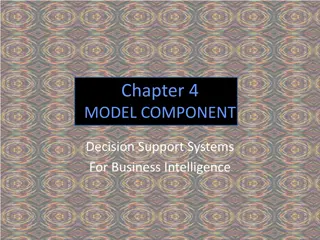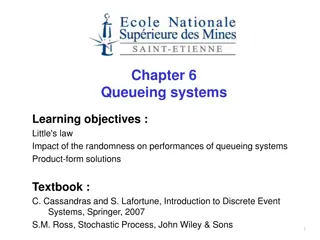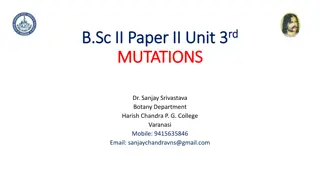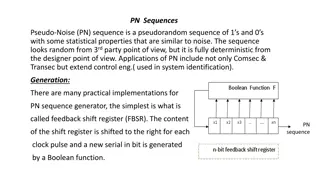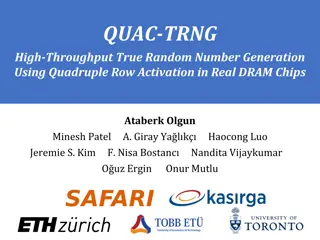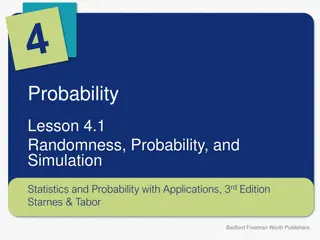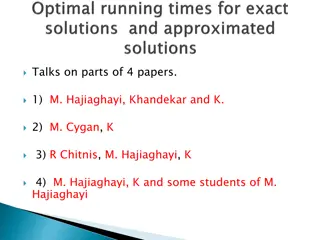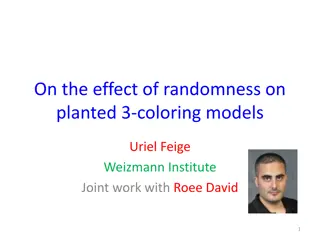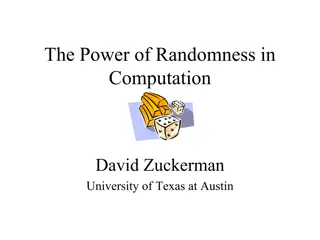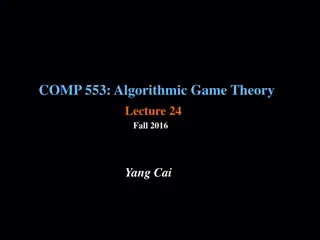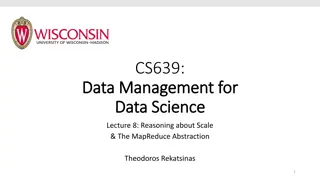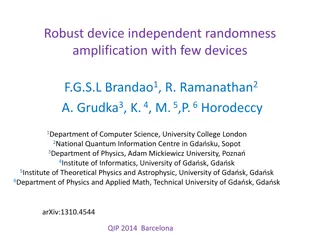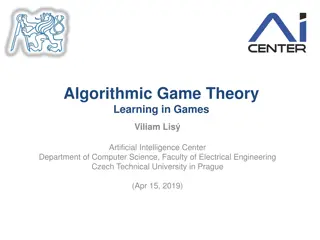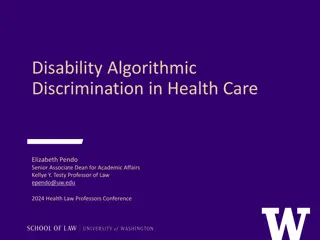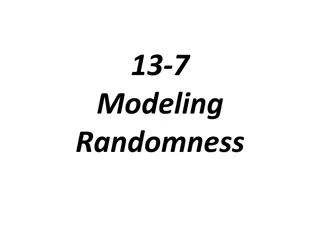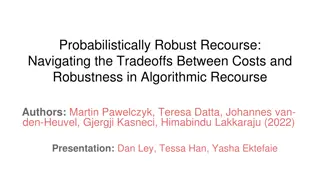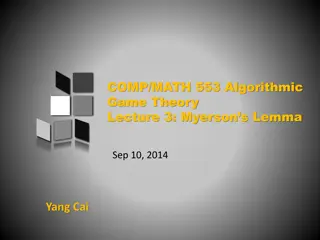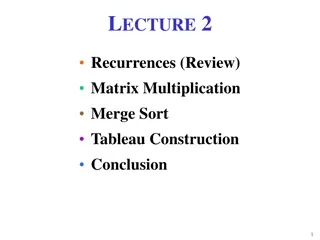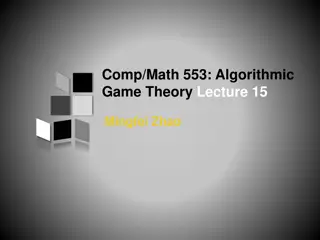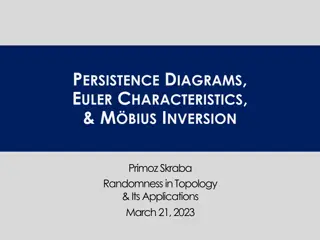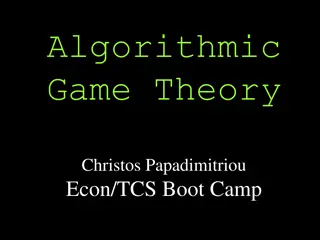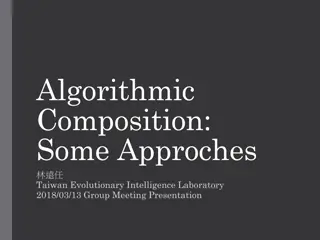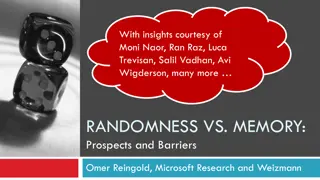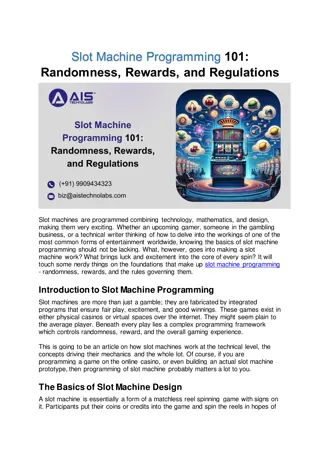Understanding Algorithmic Thinking: Key Concepts and Importance
Algorithmic thinking is a crucial skill that involves problem-solving through precisely defined instructions. This competency, applicable beyond computing, entails analyzing problems, identifying steps to solve them, and designing efficient algorithms. The importance of algorithmic thinking lies in
1 views • 13 slides
Understanding Large Language Models in Generative AI
Large Language Models (LLMs) like chatGPT are statistical pattern-recognition systems that predict the next word in a sequence based on the context. Trained on vast datasets, LLMs cluster words by understanding patterns, not true meaning. They use unsupervised learning and reinforcement to improve r
10 views • 29 slides
Decision Support Systems for Business Intelligence Modeling
Explore the process of modeling in Decision Support Systems for Business Intelligence through images, tables, and examples. Learn about the dimensionality of models, nonlinear relationships, randomness, and Monte Carlo analysis as essential components in business decision-making.
0 views • 45 slides
Understanding Probability and Randomness
Probability and randomness play crucial roles in various aspects of life. Randomness refers to uncertain individual outcomes with a regular distribution over a large number of repetitions. Probability models help describe chance behavior by defining sample spaces, assigning probabilities to outcomes
6 views • 11 slides
Introduction to Queueing Systems and Applications
Explore the fundamentals of queueing systems, including Little's law, impacts of randomness, and product-form solutions. Delve into the history of queueing theory and its applications in traffic control, planning, and facility dimensioning. Understand the classification and characteristics of simple
0 views • 90 slides
Understanding Mutations: Types, Characteristics, and Examples
Mutations are changes in the genetic material that can affect an organism's traits. This article explores gene mutations, their historical background, characteristics, kinds of mutations like spontaneous and induced, somatic and germinal mutations, and conditional lethal mutations. It also covers ge
2 views • 18 slides
HotFuzz: Discovering Algorithmic Denial-of-Service Vulnerabilities
A detailed exploration of algorithmic complexity bugs and insight into distributed micro-fuzzing methods. The study uncovers vulnerabilities through guided micro-fuzzing approaches, emphasizing the importance of AC bug detection and fuzz testing techniques such as seed inputs, fuzz observations, and
0 views • 14 slides
Understanding Pseudo-Noise Sequences and Applications
Pseudo-Noise (PN) sequences are deterministic yet appear random, with applications in various fields such as communication security, control engineering, and system identification. Generated using shift registers, they exhibit statistical properties akin to noise. Linear and nonlinear feedback shift
1 views • 19 slides
High-Throughput True Random Number Generation Using QUAC-TRNG
DRAM-based QUAC-TRNG provides high-throughput and low-latency true random number generation by utilizing commodity DRAM devices. By employing Quadruple Row Activation (QUAC), this method outperforms existing TRNGs, achieving a 15.08x improvement in throughput and passing all 15 NIST randomness tests
0 views • 10 slides
Understanding the Right to an Explanation in GDPR and AI Decision Making
The paper delves into the necessity for Explainable AI driven by regulations such as the GDPR, which mandates explanations for algorithmic decisions. It discusses the debate surrounding the existence of a legally binding right to explanation and the complexities of accommodating algorithmic machines
0 views • 22 slides
Understanding Probability and Randomness
Explore the concepts of randomness, probability, and simulation in this informative lesson. Learn how to interpret probability as a long-run relative frequency, dispel common myths about randomness, and use simulation to model chance behavior. Delve into the idea that chance behavior is unpredictabl
1 views • 13 slides
Evolution of Algorithms and Computer Science Through History
The history of algorithms and algorithmic thinking dates back to ancient times, with the development of general-purpose computational machines by Charles Babbage in the 19th century marking a significant advancement. The term "computer science" emerged in 1959, encompassing theoretical computer scie
1 views • 39 slides
Computational Thinking, Algorithms & Programming Overview
This unit covers key concepts in computational thinking, including decomposition, abstraction, and algorithmic thinking. Decomposition involves breaking down complex problems, abstraction focuses on identifying essential elements, and algorithmic thinking is about defining clear instructions to solv
1 views • 5 slides
Understanding Algorithmic Thinking in Digital Systems
Explore the application of algorithmic thinking in digital systems through the journey of Mike Clapper, the Executive Director of AMT. Learn about recognizing patterns in data, creating algorithms to solve problems, and utilizing information systems creatively. Enhance your knowledge of digital syst
0 views • 56 slides
Insights into Advanced Algorithmic Problems
Delve into discussions surrounding complex algorithmic challenges, such as the limitations in solving the 3-SAT problem within specific time bounds, the Exponential Time Hypothesis, proving lower bounds for algorithms in various scenarios, and exploring approximation ratios in algorithm design. Thes
1 views • 65 slides
Exploring the Impact of Randomness on Planted 3-Coloring Models
In this study by Uriel Feige and Roee David from the Weizmann Institute, the effect of randomness on planted 3-coloring models is investigated. The research delves into the NP-hard nature of 3-coloring problems, introducing a hosted coloring framework that involves choices like the host graph and th
0 views • 55 slides
Exploring Limited Randomness in Repeated Games
Dive into the world of randomness in repeated games through this insightful research by Moni Naor, Pavel Hubæk, and Jon Ullman. Discover the significance of randomness in algorithms, equilibria, and finitely repeated games. Explore the necessity of randomness in Nash Equilibrium and the computation
2 views • 28 slides
Sketching as a Tool for Algorithmic Design by Alex Andoni - Overview
Utilizing sketching in algorithmic design, Alex Andoni from Columbia University explores methodologies such as succinct efficient algorithms, dimension reduction, sampling, metric embeddings, and more. The approach involves numerical linear algebra, similarity search, and geometric min-cost matching
0 views • 18 slides
The Power of Randomness in Computation
Explore the significance of randomness in various computational aspects including random sampling, cooking techniques, polling methods, investing strategies, and its role in computer science. It delves into randomized algorithms, Monte Carlo simulations, cryptography, and more.
0 views • 45 slides
Enhancing Cryptographic Key Generation with High-Quality Randomness
This presentation discusses the critical aspect of ensuring high-quality randomness in cryptographic key generation processes. It explores key vulnerabilities and common failure modes, emphasizing the importance of incorporating strong randomness. The content delves into various methods and issues r
0 views • 45 slides
Algorithmic Issues in Tracking: A Deep Dive into Mean Shift, EM, and Line Fitting
Delve into algorithmic challenges in tracking tasks, exploring techniques like mean shift, Expectation-Maximization (EM), and line fitting. Understand the complexities of differentiating outliers and inliers, with a focus on segregating points into best-fit line segments.
0 views • 44 slides
Understanding Greedy Algorithms in Algorithmic Design
Greedy algorithms in algorithmic design involve making the best choice at each step to tackle large, complex problems by breaking them into smaller sub-problems. While they provide efficient solutions for some problems, they may not always work, especially in scenarios like navigating one-way street
1 views • 9 slides
Enhancing Algorithmic Team Formation Through Stakeholder Engagement
Integrating stakeholder voices is crucial in algorithmic team formation to ensure a positive team experience, quality outcomes, and high performance. This research explores learner-centered approaches and considers various team formation methods, highlighting their strengths and weaknesses in educat
0 views • 37 slides
Understanding Brouwer's Fixed Point Theorem and Nash's Proof in Algorithmic Game Theory
Explore the foundational theorems of Brouwer and Nash in Algorithmic Game Theory. Dive into Brouwer's Fixed Point Theorem, showcasing the existence of fixed points in continuous functions. Delve into Nash's Proof, unveiling the Nash equilibrium in game theory. Discover visualizations and constructio
0 views • 23 slides
Understanding Scalability and Algorithmic Complexity in Data Management for Data Science
This lecture delves into the concept of scalability in data management for data science, covering operational and algorithmic aspects. It discusses the importance of efficient resource utilization, scaling out to multiple computing nodes, and managing algorithmic complexity for optimal performance i
0 views • 47 slides
Proposal for Directive to Enhance Working Conditions in Platform Work
The proposal aims to address challenges in platform work, including employment status classification and algorithmic management issues. It seeks to improve transparency, fairness, and accountability in algorithmic decision-making, correctly determine employment status, enhance transparency in platfo
0 views • 13 slides
Understanding Debugging in High-Level Languages
Debugging in high-level languages involves examining and setting values in memory, executing portions of the program, and stopping execution as needed. Different types of errors – syntactic, semantic, and algorithmic – require specific debugging approaches. Syntactic errors are related to code l
0 views • 9 slides
Device Independent Randomness Amplification with Few Devices
This study focuses on robust device-independent randomness amplification with limited devices, emphasizing the importance of device independence in generating random outcomes free from external influences. Various sources of randomness, including Santha-Vazirani and Hmin types, and quantum mechanics
0 views • 21 slides
Algorithmic Game Theory Learning in Games by Viliam Lis
The content discusses the concept of algorithmic game theory learning in games, covering topics such as online learning, prediction, best response dynamics, and convergence to Nash equilibrium. It explores how simple learning agents achieve equilibrium outcomes and the application of algorithms in v
0 views • 23 slides
Algorithmic Discrimination in Health Care: Protecting Vulnerable Patients
Elizabeth Pendo and Jennifer D. Oliva discuss disability discrimination in health care algorithms, advocating for legal protections under Section 504, ADA, and ACA. Their article proposes strategies to combat algorithmic bias and enhance antidiscrimination efforts in the 2024 Section 1557 final rule
0 views • 13 slides
Understanding Randomness in Selection Processes
Explore two problems related to modeling randomness - one involving choosing random students to represent a homeroom and the other simulating a cereal company's prize distribution. Learn how random number tables can be used for fair selections and calculate the average number of cereal boxes a custo
0 views • 4 slides
Navigating Tradeoffs in Algorithmic Recourse: A Probabilistic Approach
This paper introduces PROBE, a Probabilistically Robust Recourse framework allowing users to balance cost and robustness in algorithmic recourse. Users can choose the recourse invalidation rate, enabling more tailored and efficient recourse management compared to existing methods. PROBE enhances cos
0 views • 17 slides
Understanding Myerson's Lemma in Algorithmic Game Theory
Myerson's Lemma is a fundamental concept in algorithmic game theory, particularly in the context of Sponsored Search Auctions. This lecture delves into the application of Myerson's Lemma to ensure truthful bidding as a dominant strategy, maximize social welfare, and maintain polynomial running time
0 views • 19 slides
Understanding Algorithmic Complexity Measures and the Master Method
In this study, we explore key concepts in algorithmic complexity, including recurrences, matrix multiplication, merge sort, and tableau construction. We delve into the Master Method for solving recurrences, examining Cases 1, 2, and 3, and providing solutions for each scenario. Additionally, we disc
0 views • 61 slides
Algorithmic Game Theory Lecture on Prophet Inequality and Auction Design
In this lecture on Algorithmic Game Theory, Mingfei Zhao discusses the Prophet Inequality and its application to single-item auctions. The lecture covers the concept of Prophet Inequality, strategies to guarantee expected payoffs, and different auction designs such as the Bulow-Klemperer Theorem and
0 views • 10 slides
Randomness in Topology: Persistence Diagrams, Euler Characteristics, and Möbius Inversion
Exploring the concept of randomness in topology, this work delves into the fascinating realms of persistence diagrams, Euler characteristics, and Möbius inversion. Jointly presented with Amit Patel, the study uncovers the vast generalization of Möbius inversion as a principle of inclusion-exclusio
0 views • 57 slides
Evolution of Algorithmic Game Theory in Computer Science
The evolution of Algorithmic Game Theory (AGT) in the realm of Computer Science showcases the intersection of economics and theoretical computation. Before 1995, notable researchers like von Neumann and Megiddo laid the foundation for AGT. Concepts such as computation as a game, bounded rationality,
0 views • 62 slides
Exploring Algorithmic Composition Techniques in Music Generation
Algorithmic composition involves the use of algorithms to create music, mimicking human composers by generating music based on specific rules and structures. This presentation delves into various approaches such as DeepBach, MuseGAN, and EMI, highlighting the use of evolutionary algorithms, machine
0 views • 35 slides
Exploring Randomness in Computation: Insights and Prospects
Delve into the realm of randomness in computation as discussed by prominent researchers including Moni Naor, Ran Raz, Luca Trevisan, Salil Vadhan, Avi Wigderson, and Omer Reingold. Uncover the significance of randomness in various facets of computing such as distributed computing, cryptography, comm
0 views • 25 slides
Slot Machine Programming 101: Randomness, Rewards, and Regulations
A concise guide to understanding the fundamentals of slot machine design, including the role of randomness, crafting rewarding experiences, and adhering to industry regulations.
1 views • 6 slides
